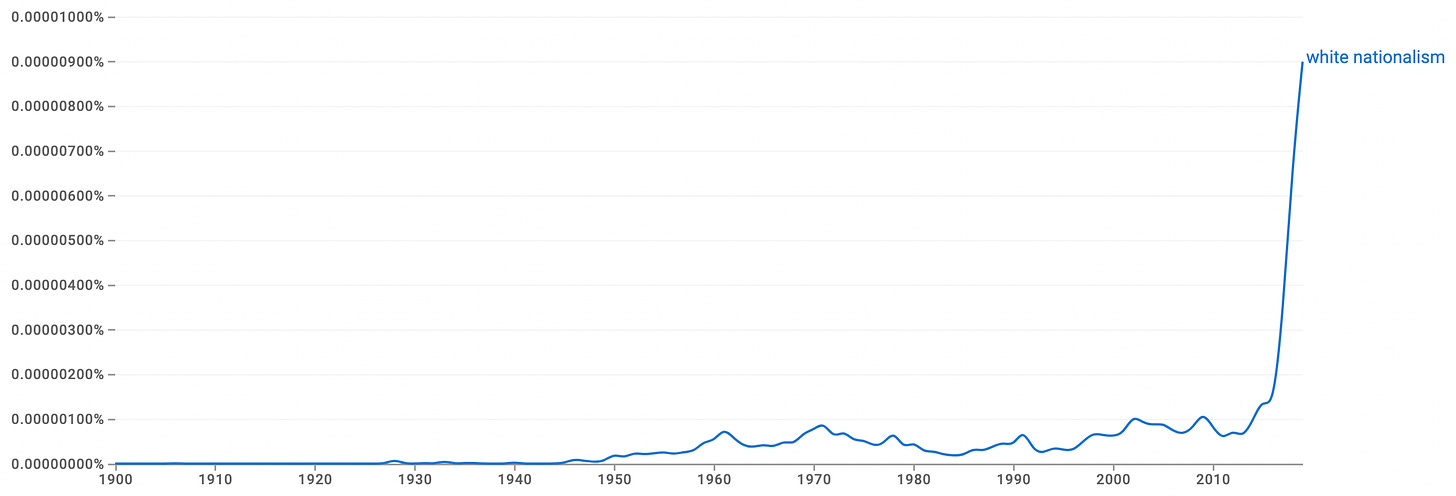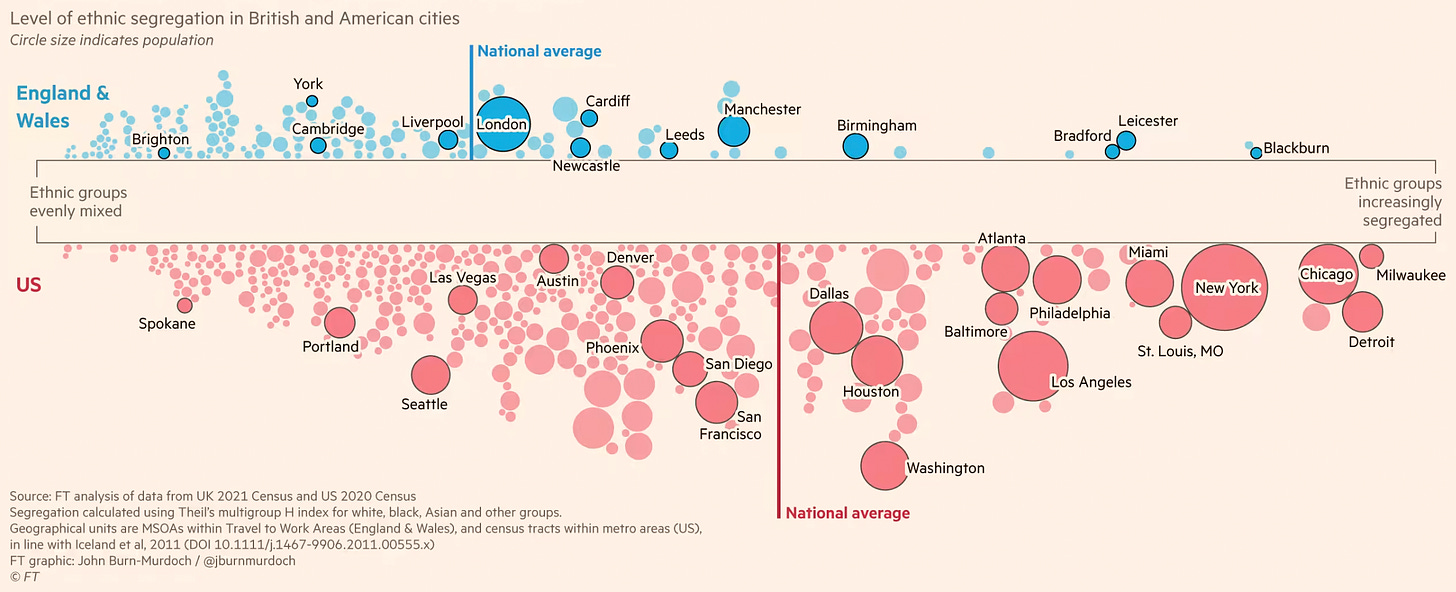Surely liberals should support white nationalism?
Surely liberals should support white nationalism?
If ethnic separatism is as horrible as white liberals say, why do so many of them choose to live, well, separately from other races?
Written by Noah Carl.
Since Donald Trump was elected President in 2016, American liberals have become obsessed with the threat of white nationalism. As you can see in the chart below, there’s been a huge spike in mentions of the term in books, which began in 2016. Likewise, Zach Goldberg and David Rozado have shown that mentions of terms like “racism” and “white supremacy” in newspapers skyrocketed in the mid 2010s.

All this is despite the fact that white nationalists comprise a tiny percentage of the US population. In a 2018 poll for the Washington Post, only 1% of white Democrats and only 3% of white Republicans said they considered themselves “supporters of the alt-right or white nationalist movement”.
There may well have been some socially desirable responding (people saying they weren’t white nationalists when they really were). But when George Hawley tried to identify white nationalists in the 2016 American National Election Survey, he still only got up to 6%. And he used a rather questionable definition, namely holding all three of the following beliefs: being white is “very or extremely” important to one’s identity; whites should “work together to change laws” that are unfair to whites; and whites face a “great deal” of discrimination in the US.
A 2017 poll for ABC News did find that 10% of Americans supported the “alt-right movement”, though at that point it wasn’t entirely clear what the term meant. For example, some may have thought it meant something like “the pro-Trump movement” or the “national populist movement”. Indeed, in the 2018 Washington Post poll Hispanics were more likely to say they were “alt-right” than were whites.
The percentage of white Americans who actually are white nationalists (as opposed to people who just have certain politically incorrect views about race) is likely to be below 5% – and probably closer to 1%.
Notwithstanding these low numbers, there have been a number of deadly terrorist attacks by individuals who could reasonably be described as white nationalists. So concern over white nationalism is understandable, even if the threat is exaggerated.
But assuming it’s true that, say, 1% of white Americans are white nationalists, that equates to around 2 million people. Which means that the majority of white nationalists are not violent. By the same token, there have been terrorist attacks by opponents of the Republican Party and by supporters of Black Lives Matter, but clearly most people who belong to those groups are not violent.
“White nationalism is different because it’s inherently violent,” someone might claim. “White nationalists want to ethnically cleanse the country of non-white people by deporting them or even killing them. So, yes, we should be far more concerned about white nationalism than about radical left-wing movements”.
I haven’t done a detailed survey of what white nationalists believe (and in case there were any doubt, I’m not a white nationalist myself). But I understand that a lot of them advocate “voluntary separation” of the races, just as the Pan-Africanist Marcus Garvey did in the early 20th century.
Is that such a horrible idea? Again, I’m not saying I support it. I know many non-white people and have no desire to be separate from them. But if some eccentrics want to live apart from people of other races, is that really so threatening?
The details matter, of course. Anyone advocating violence, coercion or forced separation certainly should be seen as threatening – and the intelligence services might want to keep an eye on them. But this goes for any ideology. Those advocating violence in opposition to the Republican Party, or in support of Black Lives Matter, should be seen as threatening too.
One can imagine the following kind of scenario. A hundred thousand white nationalists get together and buy up an area of land somewhere in the rural US, let’s say Alaska. They then form their own state by seceding from the US, and adopt an immigration policy under which only whites are allowed to settle there.
In fact, one doesn’t have to imagine, as this is roughly what the 2,800 Afrikaners who live in Orania have done (minus the formal secession). Orania is a nine square-kilometre, “whites-only” town located on the territory of South Africa. Its inhabitants insist they simply want to preserve their culture and protect themselves from crime. And interestingly, the South African government has basically left them alone. After visiting Orania in 2010, President Zuma said he was "warmly welcomed" by local leaders who had “interesting ideas”.
I don’t see anything fundamentally objectionable about this kind of scenario. Yes, I consider it odd that white nationalists find living among non-white people so intolerable that they’d rather go off and live by themselves. But I wouldn’t say their goal of ethnic separatism is odious or repugnant. I reserve those terms for people of any ideology advocating violence.
Now, there are objections one can make to secession in general. For example, allowing one group to secede might encourage others to do the same, and sooner or later you won’t have a country any more. But this isn’t an objection based on odiousness; it’s an objection based on practicality. (No one opposes Scottish independence because they find the idea of Scotland leaving the UK odious.)
The fact that liberals are so outraged by white nationalism (a racist is pretty much the worst thing you can be in their eyes) is particularly interesting in light of what we know about modern America: racially diverse liberal cities are highly segregated. Which means that white liberals choose overwhelmingly to live among other whites.
As this graphic from the FT shows, American cities are far more segregated than British cities, and the most segregated cities are strongholds of Democratic Party support. Milwaukee, Detroit, Chicago, New York and St. Louis – the most segregated cities in America – all voted for Biden by a large margin.

Here’s a map showing racial segregation in New York City. Each dot represents 120 people of a particular race: blue dots represent blacks; orange dots represent Hispanics; red dots represent Asians; and green dots represent whites. As you can see, there’s almost no overlap among the different races. The white liberal New York Times-readers who are so horrified by white nationalism live largely amongst themselves.

It’s a similar story when you look at friendship networks. A recent survey by the Public Religion Research Institute found that 66% of white Democrats report an all-white friendship network – which is only seven points less than the percentage of white Republicans who do. And a 2015 Pew Research survey found that white liberals were more likely than white conservatives to have no close black friends.
“White nationalism? Wanting to live apart from other races? That’s absolutely abhorrent! Now let me go back to my neighbourhood where 95% of my neighbours are white.”
I’m not trying to suggest that white liberals are just repressing their latent white nationalism. Nor am I trying to make the case for that particular ideology. What I’m trying to do is raise the question: if ethnic separatism is as horrible as white liberals say, why do so many of them choose to live, well, separately from other races?
In fact, shouldn’t white liberals support white nationalism (of the ethnic separatist kind)? For the price of giving up a small amount of territory, they’d be removing a large share of the most racist white people from the country – thereby presumably improving the lives of all the non-white Americans left behind. “These racists have to be part of society” seems like a strange position to take.
White nationalists who advocate violence are a threat to society and should be shunned; we can all agree on that. But is it odious to advocate “voluntary separation” of the races? It’s odd, certainly, and doesn’t reflect my own view. But I wouldn’t call it odious. (Was Marcus Garvey odious?) Ironically, the people who appear to be most outraged by white nationalism tend to live in overwhelmingly white neighbourhoods. Which makes it hard to take their outrage seriously.
Source: Aporia
Comments
Post a Comment